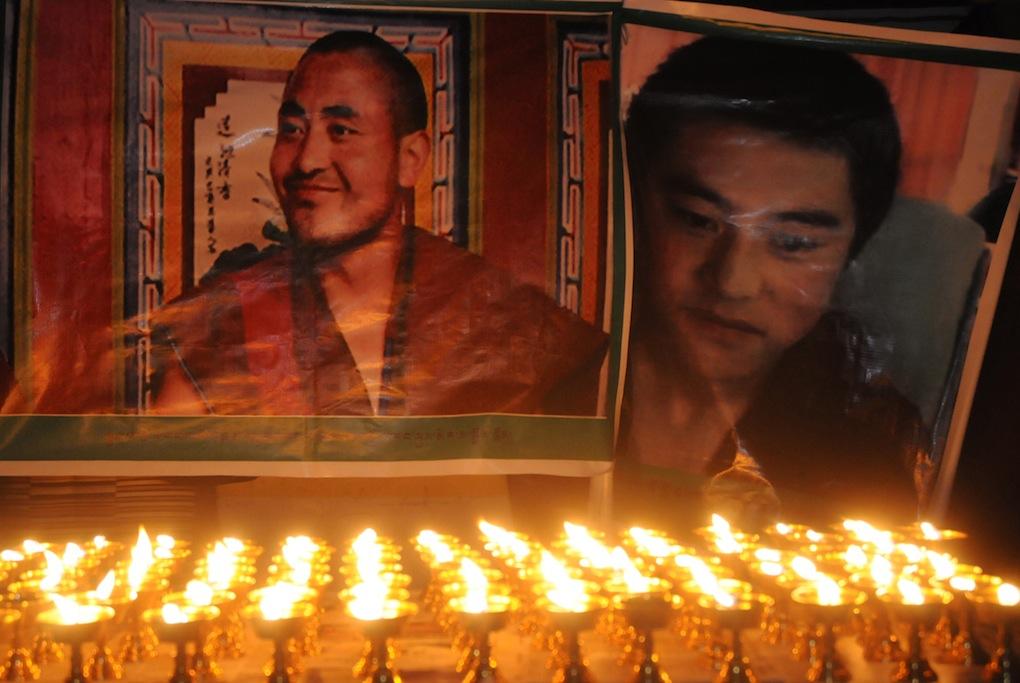Spanish court issues arrest warrant against former Chinese president over Tibet
Portraits of Jamyang Palden (L), in his thirties from Rebkong and Lobsang Tsultrim, 20, from Ngaba, both from Tibet’s Amdo region and who died by setting themselves on fire in protest, are seen in front of lit butter lamps during a vigil for Tibetans who have immolated themselves in protest against Chinese rule in Tibet, in McLeod Ganj on March 17, 2012. A Spanish court has issued arrest warrants for five senior Chinese officials over genocide claims in Tibet.
HONG KONG – Spain’s relations with China are about to suffer a world of hurt.
On Tuesday, a Spanish court issued an arrest warrant for five Chinese ex officials, including China’s former president Jiang Zemin, 87, on claims of genocide against the Tibetan people. They have not been formally charged.
The case was brought by Tibetan rights groups and a monk with Spanish nationality. Under Spanish law, genocide suspects can be tried outside their home country, under the “universal justice” principle, if one of the plaintiffs is Spanish.
The ruling, released by Madrid’s National Court, or Audencia Nacional, said the Chinese leaders bear “political and criminal responsibility” for actions in Tibet.
At a time when most Western countries are too timid to bring up human rights issues with the People’s Republic, the court’s decision stands out for its defiance.
From a geopolitical standpoint, however, the move will hurt Spain a lot more than China. China has shown itself more than willing to throw around its economic weight to punish countries that displease it, squeezing them with an array of invisible barriers and strictures.
In 2010, after the Norwegian Nobel Prize committee awarded a peace prize to dissident Liu Xiaobo, China effectively cut off all imports of salmon to Norway, reducing Norway’s market share from 92 percent in China to 29 percent in 2013. To this day, Norwegian officials find themselves unable to meet with Chinese ministers — even though Oslo had no say over the Nobel decision.
Japan has encountered a similar regime of silent embargos in its dispute with China over the Senkaku islands. When a Chinese trawler collided with Japanese Coast Guard ships and the captain arrested in 2010, Beijing unofficially suspended exports of rare-earth metals, a crucial material in Japan’s electronics industry.
If Norway and Japan’s experience is any indication, the consequences for Spanish trade could be dire.
China is Spain’s largest trading partner outside of the EU, with $27.6 billion in trade in 2012. Chinese investors have looked for bargains in Spain’s distressed real estate, automotive, and banking industries. This year, Spanish vineyards became the third largest exporter of wine to China, up 40 percent from the previous year. Spain is also trying to boost itself as a tourist attraction to Chinese travelers, who in 2012 became the biggest spenders on tourism in the world.
In short, there are lots of areas where Beijing could hurt Spain if it chose to, even though the Spanish government had no hand in the court’s decision. Spain’s government, in fact, has been one of China’s advocates within the EU. In 2010, the rotating president of the EU, José Luis Rodriguez Zapatero, argued that the EU should lift its ban on selling arms to China as a way to boost trade.
Still, given that Jiang Zemin was China’s president for 10 years, and Tibet is one of the issues guaranteed to most infuriate Chinese officials, the ruling is bound to strain these ties.
Already, the case has brought out some heated rhetoric.
China’s foreign ministry denounced the ruling as “interference” and a malicious attempt to “destroy the relations between China” and Spain. Earlier this week, the head of China’s ethnic and religious affairs committee warned that this case would bring “enormous embarrassment” to Spain and challenged the court, “Go ahead if you dare.”
It might be inconceivable that Jiang Zemin or any other Chinese leader will end up in a Spanish courtroom. Yet the same Spanish court issued an arrest warrant for Chilean dictator Augusto Pinochet. The warrant dramatically elevated awareness of the country’s rights abuses, and resulted in Pinochet’s arrest in London in 1998.
